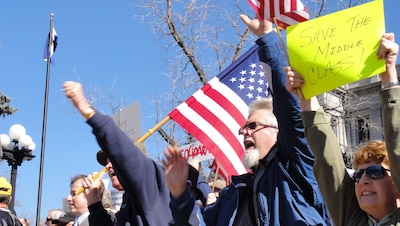Several hundred pro-labor demonstrators rallied Tuesday on the steps of the state Capitol to show support for protesters in Wisconsin fighting proposed limitations on public-sector collective bargaining rights.

Several dozen members of the Northern Colorado Tea Party staged a counter-demonstration on the street below.
Wisconsin Republican Gov. Scott Walker’s proposed budget-balancing package includes changes in collective bargaining rights for some public employees, including teachers, as well as increases in employee contributions to health insurance and pensions. The plan has sparked days of rallies and protests at the state Capitol in Madison.
Early in Tuesday’s Denver rallies, civil if heated debates took place between dueling demonstrators. Later, however, the civility vanished as the two sides lined up 20 yards apart and hurled insults at each other.
Click on these links for the latest New York Times coverage of the Wisconsin rallies, “Wisconsin senators meet without Democrats,” and reaction against a similar bill in Ohio, “Thousands gather to protest bill in Ohio.”
Meanwhile, Colorado’s House Republicans issued this statement on the demonstrations.
Could a similar scenario play out in Colorado? As EdNews noted in an earlier story:
While proposed 2011-12 cuts of $332 million in Colorado school spending could lead to teacher job losses and hit their salaries, decisions on salaries, health insurance and collective bargaining are made at the district level here.
Employer and employee contribution rates to the Public Employees’ Retirement Association are set in law by the legislature. No proposed change for teachers is pending this year, and a Republican-sponsored bill to allow school boards to decrease their pension contributions while increasing those made by employees was killed last week.
Legislation is pending that would continue for one more year a shift for state employees. That program, in effect now, increased employee pension deductions by 2.5 percent and decreased the state’s contribution by the same percentage. Several thousand higher education employees are included in that.
And Gov. John Hickenlooper has proposed increasing that shift by another 2 percent. He argues it’s a fairer way to impose cuts on all state employees. Gov. Bill Ritter used employee furloughs as a budget balancing measure, but many state workers – such as State Patrol officers, prison guards and health workers – were exempt from furloughs because of safety concerns.
